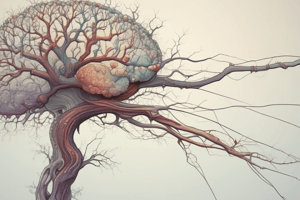Podcast
Questions and Answers
What is the primary purpose of synaptic pruning in the brain?
What is the primary purpose of synaptic pruning in the brain?
- To enhance emotional connections with information
- To promote neuroplasticity in early childhood
- To eliminate extra synapses and increase efficiency (correct)
- To create new neuronal connections
At what age do humans have the most synapses in their brain?
At what age do humans have the most synapses in their brain?
- Around 20-25 years old
- Around 15-18 years old
- Around 10-12 years old
- Around 2-3 years old (correct)
What influences synaptic pruning during the early years?
What influences synaptic pruning during the early years?
- Emotional connections with information
- Sleep patterns
- Life experiences
- Genes (correct)
What is the estimated percentage of synapses lost between the ages of 2 and 10?
What is the estimated percentage of synapses lost between the ages of 2 and 10?
What is a negative effect of waking up during the REM cycle on synaptic pruning?
What is a negative effect of waking up during the REM cycle on synaptic pruning?
What is the role of neuroplasticity in the development of the adult brain?
What is the role of neuroplasticity in the development of the adult brain?
What is the main difference between functional and structural neuroplasticity?
What is the main difference between functional and structural neuroplasticity?
What can be a negative consequence of synaptic pruning gone wrong?
What can be a negative consequence of synaptic pruning gone wrong?
What is the brain's ability to move functions from a damaged area to other undamaged areas?
What is the brain's ability to move functions from a damaged area to other undamaged areas?
Why is sleep important for synaptic pruning?
Why is sleep important for synaptic pruning?
Study Notes
Synaptic Pruning
- Synaptic pruning is a natural process that occurs in the brain between early childhood and adulthood.
- During pruning, the brain eliminates extra synapses, which are brain structures that allow neurons to transmit signals to each other.
- This process is like "cleaning" the mind, and it's influenced by genes in early years and life experiences in later life.
- Pruning is essential for the brain's efficiency, allowing it to remain efficient and adapt to new complex information as we age.
- Emotionally connected information is more difficult to forget or prune.
Brain Development
- At 2-3 years old, the brain has the most synapses it will ever have, and then pruning begins.
- Between 2-10 years old, about 50% of synapses are lost.
Importance of Sleep
- Good sleep is necessary for effective pruning.
- Waking up during the REM cycle can negatively impact pruning.
Neuroplasticity
- Neuroplasticity is the brain's ability to change and adapt in response to experiences and learning.
- It enables the brain to make changes to itself, including forming new neuronal connections.
Types of Neuroplasticity
- Functional neuroplasticity: the brain's ability to move functions from damaged areas to undamaged areas.
- Structural neuroplasticity: the brain's ability to change its physical structure as a result of learning.
Promoting Neuroplasticity
- Ways to promote neuroplasticity include learning a new language, expanding vocabulary, using the non-dominant hand, creating artwork, reading, learning new skills, doing puzzles, and mindfulness meditation.
Studying That Suits You
Use AI to generate personalized quizzes and flashcards to suit your learning preferences.
Description
Learn about synaptic pruning, a natural process in brain development where extra synapses are eliminated, and its relationship with sleep and emotional connections.




